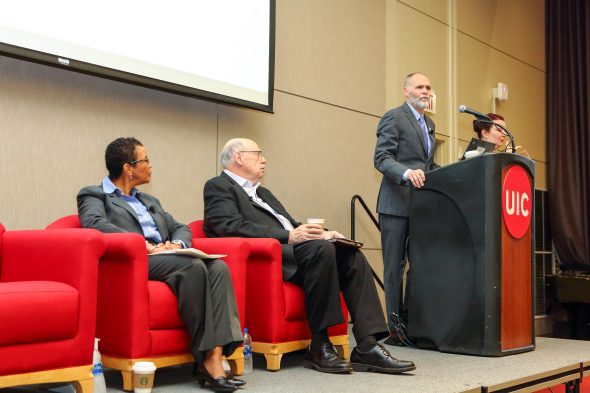New Illinois, Chicago after elections?

Christopher Mooney, Russell Arrington Professor of State Politics and a political science professor at UIC, speaks during the Oct. 2 Campus Conversation event. (Photo: Jenny Fontaine)
With federal, state and local seats up for grabs in the upcoming elections, Illinois candidates are working hard to earn public support, but people should work harder to decide who actually makes the cut.
Why? A lot is at stake, guest speakers told audience members at the October Campus Conversation, a discussion that invites experts to explain and explore hot topics and is sponsored by the Office of the Provost and Vice Chancellor for Academic Affairs.
The latest discussion, which took place Oct. 2, focused on 2018-19 elections in Illinois and whether they can result in change.
Christopher Mooney, Russell Arrington Professor of State Politics and a political science professor at UIC, talked about the importance of state legislative elections.
November ballots can impact control over the House and Senate.
“It is really crucial which parties hold the majority in each chamber,” said Mooney, who added that the battleground for who wins in Illinois continues to be voters in the suburbs.
Jim Nowlan, a former republic state legislator and advisory board member for the Institute of Government and Public Affairs, shared his predictions for the gubernatorial elections.
Nowlan cited Gov. Rauner’s loss of his Republican base and a significant lack in enthusiasm for his re-election as reasons why the public not vote for him. Nowlan noted that J.B. Pritzker, Rauner’s Democratic challenger, “is supported with intense fervor” by unions and the state, which will likely result in a favorable outcome for Pritzker.
Democratic campaign strategist Delmarie Cobb shifted the talk to the mayoral race. She asked voters to look for a mayor with a vision and mission to revitalize Chicago communities, especially those on the South and West sides.
Cobb also said that a push for progressive revenue sources, job creation, support for education, and a move to stop violence in the city should be a priorities for any serious mayoral candidate.
“This is a defining moment when we as voters have the opportunity to change the trajectory of Chicago,” she said.
Moderator Dick Simpson, a political science professor and former Chicago alderman, encouraged UIC students to vote.
“We’re hoping here at UIC to register more than 1,000 new voters,” he said, adding that the university is on track for reaching that number for the midterm elections.
UIC’s bigger goal is increasing voter turnout.
“All that matters on Election Day is who shows up,” Simpson said.
The next Campus Conversation, titled “Mental Health and the College Student,” is scheduled for Oct. 30. The event will take place from 12:30 p.m. to 2 p.m. in Student Center East.
